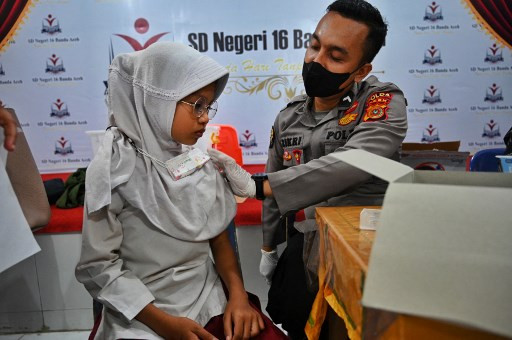Popular Reads
Top Results
Can't find what you're looking for?
View all search resultsPopular Reads
Top Results
Can't find what you're looking for?
View all search resultsClinical trials of homegrown candidate vaccine begin
If trials successful, researchers hope to obtain EUA by June.
Change text size
Gift Premium Articles
to Anyone
I
ndonesian researchers recently began phase one clinical trials of a domestically produced COVID-19 candidate vaccine, a development that may bring the country closer to producing its first homegrown coronavirus jab.
Airlangga University and partner PT Biotis Pharmaceuticals, which have developed the candidate vaccine under the Merah Putih initiative, claim that if the clinical trials are successful, the vaccine may be mass produced by July or August of this year.
The effort to produce a homegrown vaccine started in the early days of the pandemic as the country sought to achieve vaccine self-sufficiency amid an international scramble for scarce supplies.
The research team is part of a vaccine development consortium led by the Education, Culture, Research and Technology Ministry. Each constituent research team is developing a different COVID-19 candidate vaccine through various means, including the use of the inactivated virus, mRNA and DNA.
Early steps
On Feb. 7, the Food and Drug Monitoring Agency (BPOM) granted the Airlangga-Biotis research team approval to conduct phase one clinical trials on humans.
Some 90 volunteers received a first dose of the candidate vaccine on Feb. 9. They are set to receive the second dose 28 days later.
The vaccine candidate employs an inactivated version of the SARS-CoV-2 virus, which causes COVID-19.
Airlangga University’s coordinator for COVID-19 research products, Ni Nyoman Tri Puspaningsih, said the volunteers had not reported any side effects so far.
She added that if the phase one clinical trials went smoothly, the researchers would start a second phase of trials by the end of March and would proceed to the third phase in April.
“If all goes well, we could obtain emergency use authorization [EUA] from the BPOM in June and we could begin mass producing the vaccine by July or August,” Nyoman told The Jakarta Post on Feb. 16.
She said the team had struggled to find suitable volunteers for the clinical trials, as it was difficult to find people who had not been vaccinated in Surabaya, where the trials were taking place. As of Tuesday, some 131 percent of the targeted population in the city had received a first vaccine dose and some 113 percent had received a second.
The research team expects to need 400 volunteers for the second phase of clinical trials and 5,000 for the third.
Nyoman said the team had been working with regional leaders from other parts of East Java to find volunteers for the second clinical trials, adding that it planned to expand the scope of the phase three clinical trials to health facilities throughout the country to meet the volunteer target.
Nyoman said preclinical studies had suggested that the vaccine candidate was effective against various strains of the coronavirus, including the Delta variant. Although researchers did not test the vaccine’s effectiveness against the Omicron variant, which is currently the dominant strain worldwide, she claimed she was confident the candidate vaccine would also be effective against it.
Plans for the jab
The Merah Putih candidate vaccine, Nyoman added, would be mainly used to inoculate children and to supply booster doses for adults. She added that if the clinical trials were successful, Biotis was expected to manufacture around 20 million doses of the vaccine per month.
In January, Health Minister Budi Gunadi Sadikin said Indonesia had a sufficient supply of vaccines, which had come mostly from international grants, to provide the remaining targeted populations with three doses.
The acting head of the National Research and Innovation Agency (BRIN) life science research organization, Iman Hidayat, said that despite the abundance of vaccines and the progress made by Airlangga University’s research team, the other researchers in the consortium would continue their work on developing alternate types of COVID-19 vaccine candidates as part of the Merah Putih project.
"All local vaccines that are currently being developed will be mass produced if they meet the necessary requirements and can obtain EUA from the BPOM," Iman said in a statement.
He added that the remaining research teams were working on generating COVID-19 vaccine seed candidates with high viral yields so they could be mass produced at a low cost.
Budiman Bela, a lead researcher for local vaccine development at the University of Indonesia (UI) – which is part of the vaccine consortium – said his team aimed to carry out the first and second clinical trials of a DNA-based vaccine by the end of the year and to conduct phase three clinical trials by early 2023.
"We want to finish this vaccine for the sake of science. Even if the pandemic is over, we can use our experience and knowledge in developing a COVID-19 vaccine to create vaccines for other diseases, like HIV and hepatitis, or to develop gene therapy for cancer patients," he told the Post on Monday.
Budiman said that if it was successful, the DNA-based vaccine candidate could be used to inoculate people in remote areas of the archipelago, as it did not require cold-chain storage.










